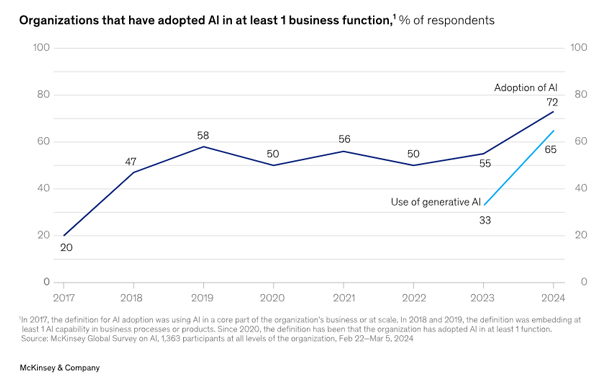Just when you’ve wrapped your head around a concept like Generative AI or Large Language Models (LLMs), Silicone Valley throws a new one at us.
This new word is ‘Agentic AI’, and it could supercharge AI adoption in the coming year.
If you’ve been on the fence about AI and are reluctant to invest, I want to walk you through this concept and explain why it could be time to revisit tech stocks.
First, let’s take one step back to learn what all the buzz is about.
The next era of AI — Agentic
You’ve probably heard of Generative AI (GenAI). Systems that use deep learning models to process vast amounts of data and loosely simulate human thinking.
By making connections between all this data, it ‘generates’ relevant new content. It’s not exactly ‘thinking’, rather connecting the dots.
While most of us have grown familiar with AI chatbots that simply respond to our questions, agentic AI represents something far more sophisticated.
Instead of just responding to questions, this AI will start taking action.
Think of it as the difference between a helpful librarian who answers your questions and a proactive personal assistant who not only answers questions but takes initiative, makes plans, and carries out complex tasks on your behalf.
This isn’t just a clever chatbot — it’s AI that can actually think ahead and help you achieve specific goals.
This hasn’t come from a single major breakthrough but from combining many teams’ small gains. Now, we’re just starting to see the fruits of that labour.
Earlier this week, Google released its latest AI called ‘Gemini 2.0’.
Looking past the fluff, the video highlights the major concepts that lay the foundation for this new era.
- Multi-modal interaction and memory: AI now has all the tools to see, hear and interact across many domains. AI can look at a video, photo, website, or real object and understand. From there, it can interact with your phone, web browser or through robotics.
- ‘Chain-of-thought reasoning: The race for AI to respond quickly drove research into a wall. New breakthroughs have given AI the early stages of robust reasoning that can refine its decision-making process.
- Goal-oriented algorithms: These systems are programmed to work towards specific goals rather than simply respond to a question.
Putting all this together, you have systems that can think, plan, remember, adapt, and take appropriate action.
Okay, so that’s the gist. Now, I can understand you’re probably sceptical.
Remember ‘Blockchain’ or ‘Web 2.0’?
These words are now relics. Why won’t Agentic just be another one?
Because, unlike those words of yesteryear, Agentic represents something that will actually have real-world use.
And it’s only going to grow from here.
Adoption curve
At the beginning of 2024, the adoption of AI had already begun to ramp up.
Around 72% of organisations had already incorporated AI into one business function, while over half had multiple functions AI was helping with.
| |
| Source: McKinsey & Company |
It’s no surprise most of that early AI use is supporting marketing teams with content.
At this stage, companies are happy for AI to be another low-level content writer.
But this new era promises personal assistants for each and every one of us.
Imagine having your own PA who can look at your calendar, make proactive recommendations, and take action on your behalf.
Or meeting minutes that are automatically transcribed and sent to relevant parties, highlighting their responsibilities in their native language.
Your own AI can then proactively help research and draft the documents you need for the coming week.
The possibilities from here are vast and will eventually be tuned for almost every sector or job.
In healthcare, for example, Agentic AI is accelerating drug discovery by autonomously designing and running experiments.
While in customer service, some AI agents can now take actions like crediting your account or opening services, rather than wasting your time.
Of course, we are still early in this new era. But once the kinks are ironed out, adoption will explode.
With that comes the demand for the companies powering it.
That’s data centres, energy companies, and many of the Magnificent 7.
Locally, on the ASX many of these companies have pulled back to prices not seen since the August drop.
Now could be a good time to pick up some bargains before any potential run higher.
Looking at the bigger picture, what we’ve seen in 2024 is that businesses have been reluctant to shift company-wide systems towards AI.
Many are waiting until they feel the outcomes are clearer and their brittle systems can handle it.
But that’s the key thing about AI you need to understand.
Its impact won’t just be incremental.
Like the internet, it’ll result in massive business model re-designs that completely upend old models.
I would argue that this next era of AI should be the thing that tips a major shift.
For those who remain sceptical of AI or its ability to help you with anything deeper, mark this moment and see how far we come by the end of 2025.
Regards,
 |
Charlie Ormond,
Tech Analyst, For Alpha Tech Trader



Comments